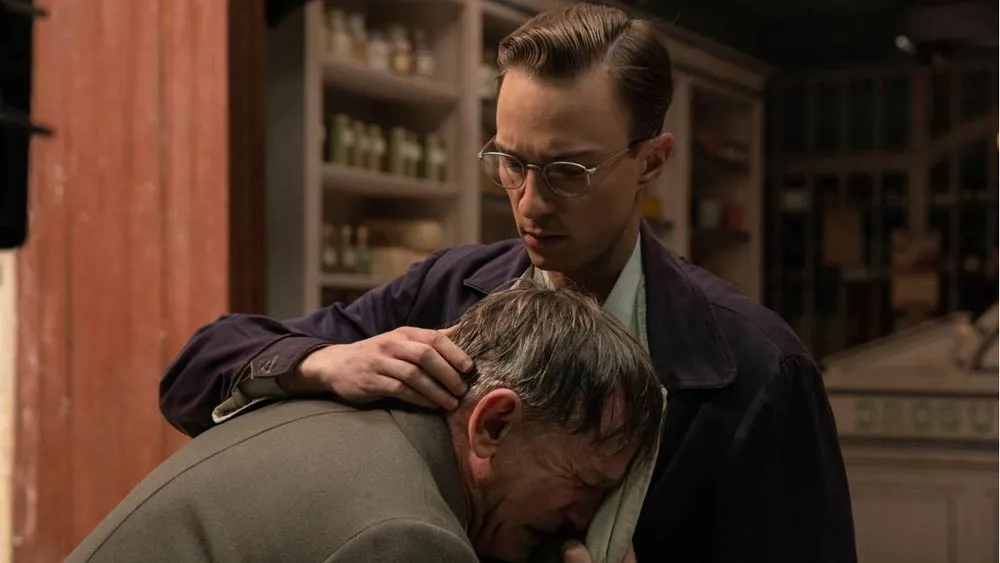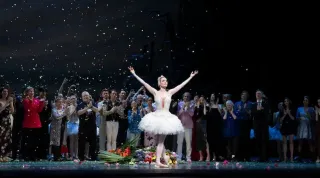September 11, 2015
A Brilliant Young Mind
Kilian Melloy READ TIME: 4 MIN.
Director Morgan Matthews and screenwriter James Graham collaborated on the story for "A Brilliant Young Mind." The results are mixed.
Asa Butterfield ("Ender's Game") stars as Nathan, an English mathematics prodigy whose social and emotional capabilities are affected by a suite of characteristics sometimes associated with superior intelligence -- among them synesthesia, trouble connecting to others emotionally, some intense number-and-pattern centered OCD, and a keen sensitivity to light and color. Add to all that the emotional trauma of seeing his father (Martin McCann) die in a car crash, and it's a wonder Nathan isn't shipped off to an institution with some dire-sounding misdiagnosis and put on a diet of soporifics.
Edward Baker-Close plays Nathan as a 9-year-old, starring in the film's early scenes and appearing in numerous flashbacks. After his father's death, Nathan's mother Julie (Sally Hawkins) takes the lad in for specialized tutoring by an adult math whiz named Martin (Rafe Spall, "Life of Pi"). Martin's a gruff, blunt sort; he hasn't got any interest in handling the kid with kid gloves, in part because Martin suffers from MS and hasn't got a lot of leftover pity to give away.
Seven years later, Martin and Julie see the now-teenaged Nathan off to a two-week training camp for prospective team members to represent Britain in the International Mathematical Olympiad. The camp is in Taipei, Taiwan; the coach, as it were, is a man called Richard (Eddie Marsan), an old friend of Martin's who is, if anything, even less given to sympathy. The Chinese prospective team members are also training there, under the supervision of a Mr. Laoshi (Orion Lee); the beautiful and brilliant Zhang Mei (Jo Yang) is one of them. She catches Nathan's eye; but while he regards her with a kind of naive, confused surprise, others look at her with some skepticism, because she is Mr. Laoshi's niece.
Adolescent hormones rage alongside coolly competitive mindsets, theorems and proofs tossed about by the kids the same way they make up rap songs or riffs on Monty Python sketches. Some of the teens seem perfectly normal aside from being young geniuses; others exhibit signs of autism and other tics. Nathan himself is painfully shy and anxious, especially at the prospect of physical contact -- shaking hands is bad enough, but as he and Zhang Mei draw closer together his desires and aversions come into marked conflict. Back home, Martin and Julie circle the notion of coupledom -- with Martin's MS-related impotence proving a major stumbling block.
There's almost too much going on here, and the film has a busy, superficial quality that contributes to its inability to engage the emotions. Part of the problem is how the movie fails to put the audience into Nathan's mind, except for a few brief passages that show us how the world looks through his eyes, with heightened colors the principle sign that we've shifted to his point of view. There are none of the gimmicks used in movies like the similarly-titled "A Beautiful Mind," with its flashing cascades of numerical values, which at least served as a gesture toward replicating how a high-powered, mathematically-geared mind works; nor is there any build to a genuine sense of excitement about mathematics, as was the case in the 1988 film "Stand and Deliver," in which Edward James Olmos played a math teacher whose methods and hard-nosed affect drew unexpected competence in calculus from a classroom full of previously underperforming high schoolers.
Instead, what we have here is a m�lange of familiar tropes and character types that feel as carefully calibrated as a page of equations. It's hard not to get the sense that this film is the result (or at least the tail end) of a recent mini-spate of movies centering on clever Brits, such as the Stephen Hawking biopic "The Theory of Everything," which netted star Eddie Redmayne an Oscar, or the Benedict Cumberbatch -- starring "The Imitation Game." Both of those movies benefited from tighter focus and cleaner through-lines; they also had the advantage of being about real people, whereas this film is fiction and has a pasted-together quality -- part troubled teen drama, part math geek flick, part public service announcement. Nathan (and those like himself at the camp) feels less like a complicated person than a cobbled-together compendium of features and qualities.
Where the protagonist goes, the narrative follows; the story has a plot and a general shape, and yet drifts along without much urgency and never achieves tautness or definition. It does, however, come up with some too-direct test questions that relate, in Nathan's mind, to the trauma of losing his father, and therefore trigger the deep emotional responses that humanize him for the viewer. The intention was probably dramatic impact, but the effect is lazy writing.
The cast do fine work here, particularly Butterfield; they make bearable the long slog through a running time of just under two hours. There is a sweetness about the film's ending, but it also feels insubstantial and a little unrelated to what went on before, and it doesn't make the movie feel any less long or disjointed in retrospect. Don't be surprised if the only lasting impression you take from this film is a desire to jokingly jam French fries into your nostrils (something that happens during a key moment).
Kilian Melloy serves as EDGE Media Network's Associate Arts Editor and Staff Contributor. His professional memberships include the National Lesbian & Gay Journalists Association, the Boston Online Film Critics Association, The Gay and Lesbian Entertainment Critics Association, and the Boston Theater Critics Association's Elliot Norton Awards Committee.






